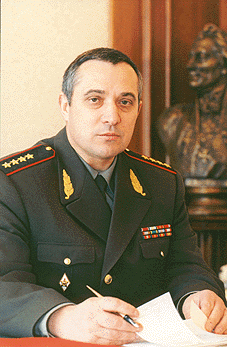 |
||
| SITE MAP | Unclassified | 13 Aug 02 |
|
Directory of RF Defense Related Agencies and Personnel |
||
|
|
Генерал aрмии КВАШНИН Анатолий Васильевич
|
 |
Начальник Генерального штаба Вооруженных Сил РФ - первый заместитель министра обороны РФ |
||
|
|
||
 |
||
| SITE MAP | Unclassified | 13 Aug 02 |
|
Directory of RF Defense Related Agencies and Personnel |
||
|
|
Генерал aрмии КВАШНИН Анатолий Васильевич
|
 |
Начальник Генерального штаба Вооруженных Сил РФ - первый заместитель министра обороны РФ |
||
|
|
||
Образование:
Служба:
|
Education:
Service:
[FBIS Translated Excerpt] The History and the Geography The historical chronicles attest: The Kvashnins' boyar stock is quite ancient and respected in Russia. Its progenitor, a certain Nestor Ryabets, left Galicia for Moscow with his army roughly in the year 1300. His son, Rodion, subsequently was a boyar under Ivan Kalita, and his grandson, the boyar Ivan Kvashnya, led the Kostroma Regiment on Kulikov Field One of the old colleagues of the current chief of the General Staff, who completed a tour in a small provincial garrison with the rank of colonel, stated in a conversation with a correspondent of Agentstvo Voyennykh Novostey: "Even during the Soviet years Anatoliy Vasilyevich didn't shun an opportunity to show off his lineage. And he often let it be known to us peasants and proletarians that fate had preordained that he assume a position worthy of his origin. Incidentally, as a young man he was tenacious and quite purposeful." Anatoliy Kvashnin was born in 1946 in Ufa (Bashkiria). After school, he entered the Kurgan Engineering Institute, which he completed in 1969. He was called up to military service as a lieutenant in the position of the deputy commander of a technical company. Military service appealed to him, and he submitted a request to remain in the armed forces. Anatoliy Kvashnin's colleagues from the early 1970s recall that, when he wrote the report requesting to remain in the armed forces, Lieutenant Kvashnin's commanders initially intended to deny it. But fate lent a hand. An accident occurred in the company in which he was serving; a tank caught fire. Kvashnin did not falter and pulled the driver-mechanic from the fire. At the same time, he himself, the commander, was also at fault in the incident, since his subordinates usually violated safety techniques. Nevertheless, the rescuer was rewarded; they declared the lieutenant a hero and accordingly approved his request. And here is a telltale episode by now from Kvashnin's general's biography. In the id-1980s, one of the military journalists serving in the Central Asian Military District, where Kvashnin commanded a division, witnessed an ugly scene in which the division commander played a part. At the inspection of a formation, General Kvashnin went up to one soldier and ordered him to remove his boot. It was revealed that the soldier was wearing socks instead of the regulation foot bindings on his feet. The general forced the soldier to unbutton his trousers and again revealed a violation of regulations; the soldier was wearing "non-uniform" shorts. All of this should have been nothing. The proper "uniform clothing" is checked precisely this way everywhere in the army; but Kvashnin ascended a platform and ordered the soldier to march along the formation in one boot and with his trousers down to his knees; he himself accompanied all of this with the choicest swearwords for the entire parade ground. Incidentally, the head of the district's political administration, Lieutenant General Gennadiy Kochkin, to whom the journalist related this episode, affectionately reprimanded the young general by telephone and advised the journalist to immediately forget about it. The Anti-Missile Offensive Anatoliy Kvashnin's focus on his career is also borne out by the circumstances of his appointment to the position of commander of the forces of the North Caucasus Military District. In February 1995, after Chechen fighters left the 81st Tank Regiment smoldering during the assault on Grozniy, the commander of the forces of the North Caucasus Military District, Colonel-General Aleksey Mityukhin, the brother-in-law of then Defense Minister Pavel Grachev, fell headlong from his position. Several generals who were popular in the arm declined the "hot" vacancy; consent automatically entailed accountability for troop operations in Chechnya. Kvashnin decided on it and did not miscalculate; in June 1997 he received the post of Chief of the General Staff" (Profil, 31 Jul 2000). "In the corridors of the Defence Ministry, the incumbent chief of the General Staff is called 'grey eminence' behind his back. Unlike Sergey Ivanov, who appears often on TV, Army Gen Kvashnin prefers to stay in the background. Rumour has it that he hates journalists, especially after the first war in Chechnya, where he was in command of the federal forces during the bloodiest period. "The General Staff chief terrifies his subordinates. As he once said after dismissing 427 generals, he "purged the Defence Ministry to the limit". Recently he lashed out at the head of the personnel department of the North Caucasus Military District, Maj-Gen Sergey Kucheryavyy, and threw him out of a meeting in Khankala. The fifty-year-old officer died from a heart attack as soon as he arrived in hospital" (Argumenty i Fakty, 26 Feb 02). |